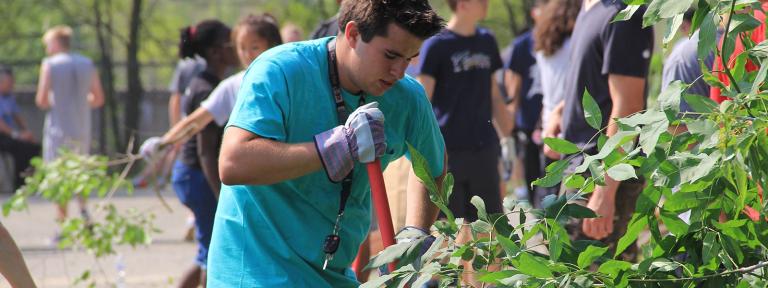
“This new funding for public safety in the University Avenue corridor will lay the foundation for future economic development and neighborhood revitalization.”
Efforts to create a safe, walkable University Avenue Corridor region connecting McLaren Regional Medical Center, Kettering University and surrounding neighborhoods to downtown Flint along University Avenue received a major boost with a $1 million federal grant to Kettering University that will support neighborhood revitalization efforts.
The Byrne Criminal Justice Innovation (BCJI) Program grant -- part of the Obama Administration’s Neighborhood Revitalization Initiative -- will provide $1 million over three years to help convert the University Avenue Corridor into a vibrant region by developing and implementing sustainable crime prevention strategies that spur community engagement and development and promote health and safety. Kettering and Flint were one of only six communities nationally to receive the BCJI grants.
The grant encourages a wide cross section of partnerships. Kettering, along with the Flint Area Reinvestment Office (FARO) and the Local Initiatives Support Corporation (LISC), led the grant proposal process. Kettering will act as the fiscal agent for the grant.
Kettering University and community partners will have already ongoing efforts to improve the University Avenue Corridor enhanced by a major federal grant.
The grant has also enabled research collaborations among many universities, including Kettering University’s Computer Science department, the Michigan State University School of Criminal Justice, the University of Michigan (Ann Arbor) Youth Violence Prevention Center and the University of Michigan-Flint’s Department of Health and Health Sciences and Department of Earth and Resource Science. MSU’s School of Criminal Justice will act as the lead research agent for the grant.
“This is tremendous news. This grant will bring in significant resources to further enhance an already rapidly improving part of the city,” said Kettering University President Dr. Robert K. McMahan. “The grant allows Kettering, the University Avenue Corridor Coalition and our many community partners to continue to lead Flint’s transformation into a world class research and knowledge center that is built upon the city’s vast higher education, healthcare, technology and industry resources. This grant is also a perfect example of how collaboration within the city can lead to significant progress. Not only did we work collaboratively with multiple organizations to secure this grant, but with it some of the country’s finest research institutions will be working closely right here in Flint over the next three years to develop and implement placemaking solutions for rebuilding our community that are sustainable and ensure a bright future for the region.”
The grant will support researchers and community partners as they develop community-oriented plans that transform distressed neighborhoods into thriving ones. Organizations partnering in the grant will strategize and then implement data-driven crime prevention, enforcement and intervention strategies with input from law enforcement, community members and researchers that will result in long-term resources that not only make the area safer, but are replicable and scalable to potentially impact other areas of the city.
“This new federal grant is welcomed news for Flint," said U.S. Congressman Dan Kildee. "This innovative approach, which prioritizes public safety and represents a partnership between Kettering University, area residents and local law enforcement, will help reduce and prevent crime along University Corridor neighborhoods, including Carriage Town, Mott Park and Glendale Hills. I applaud the University Avenue Corridor Coalition for their work to secure this federal grant and I look forward to continuing to work with them to make our community stronger.”
This project brings together 16 law enforcement and security force entities to combine their forces as CORE Security (Community Officers Responding Effectively) which includes the Flint Police Department, the Michigan State Police, the UM-Flint Department of Public Safety, the security forces of Kettering University and Hurley Hospital.
“This new funding for public safety in the University Avenue corridor will lay the foundation for future economic development and neighborhood revitalization,” said Flint Mayor Dayne Walling.
Since 2013, Kettering University has razed a significant number of dangerous, blighted structures within the University Avenue Corridor region, replacing them with green space that the University maintains. Kettering also took over operations of Atwood Stadium, a 10,000-seat community venue that was previously a city park and has subsequently begun major renovation to the facility in the service of the community. In 2014, Kettering completed work on repairs to lighting, signage and masonry within in the stadium and also began work to repair restrooms, a concession area and locker rooms.
The University Avenue Corridor Coalition (UACC), a collaborative group of community stakeholders that includes representatives from universities, hospitals, businesses, neighborhood associations, civic organizations and other community members, will be instrumental in the implementation of the grant, which will lend support to some of the organization’s already ongoing efforts in the area.
“Kettering, the UACC and our many partners within the city of Flint have already made major efforts to enhance the safety, appearance and development potential in the University Avenue Corridor,” McMahan said. “This grant will not only allow for the continuation of those efforts, it will lead to making the area more pedestrian friendly, crime-free and enable easier connections the growing activities downtown Flint through sidewalks, trails, pathways and other features that will continue to make Flint a great place to live, study, play and work.”